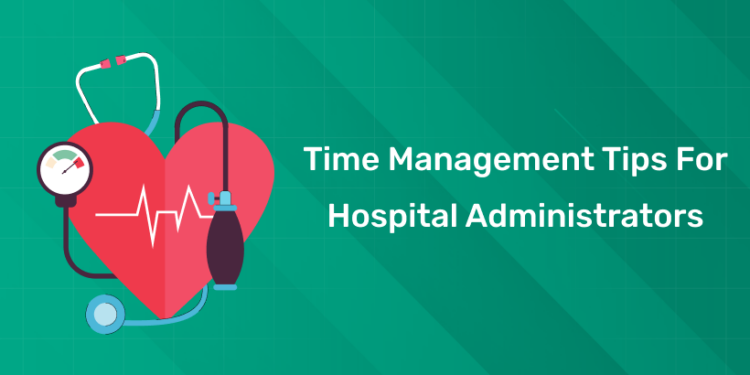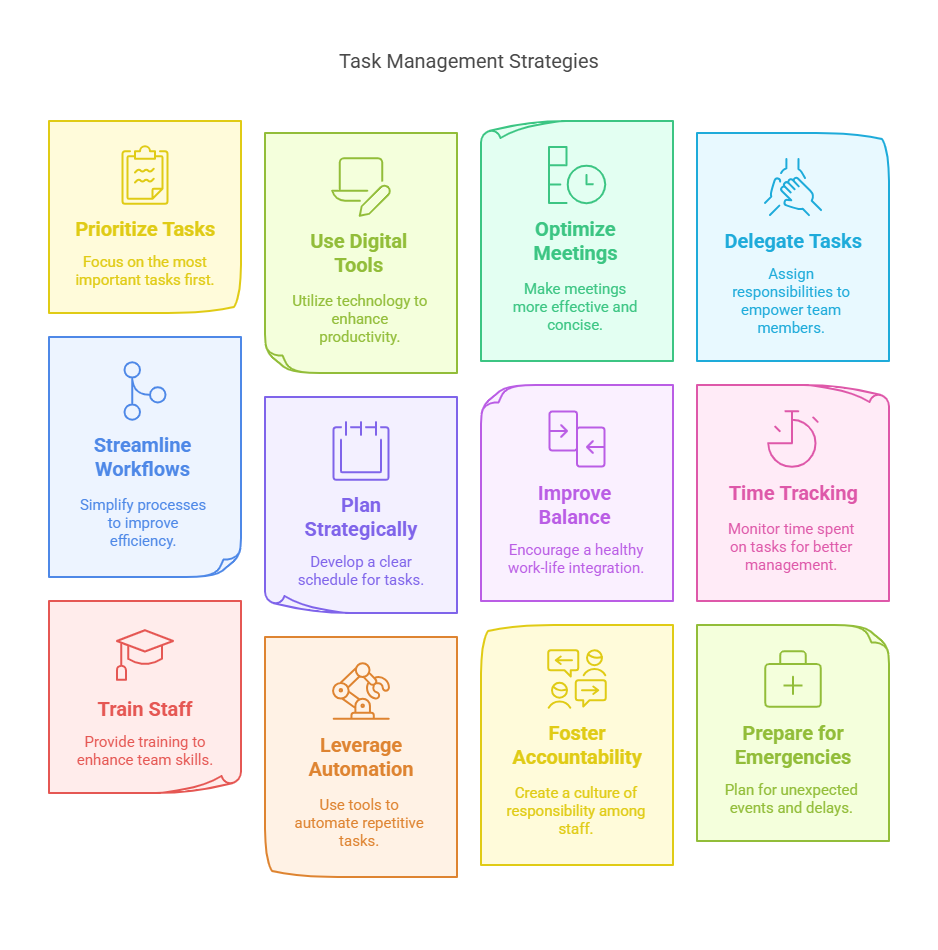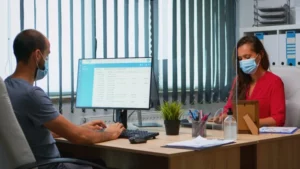Table of Contents
Key Takeaways:
- Prioritizing tasks using proven frameworks like the Eisenhower Matrix helps focus on what truly impacts hospital operations and patient care.
- Leveraging digital tools such as Electronic Health Records (EHRs) and AI-powered chatbots significantly reduces manual administrative burden.
- Efficient communication and meeting management are essential to preserve valuable time for strategic decision-making.
- Delegation and empowering staff enhance hospital workflow and fosters leadership within teams.
- Planning for emergencies with contingency strategies ensures hospital readiness and minimizes disruptions in critical situations.
Time management is important for everything, but especially in hospital management. Hospital management is highly stressful and must be done with precision and efficiency. If you want to read about time management tips for hospital administrators, great! You have come to the right place. In this article, we will discuss hospital administration, time management tips for hospital administrators, action plans for given tasks, etc.
Explore Your Future in Hospital Administration! Enroll now
Introduction
Hospital administration is a uniquely high-pressure and complex role that demands sharp multitasking skills, strategic foresight, and impeccable time management. Unlike general management, hospital administrators face the additional challenge of balancing patient care priorities with stringent regulatory requirements, emergency responsiveness, and technological advancements.
Effective time management in this environment is not just about personal productivity—it’s about ensuring that every decision and action directly contributes to patient outcomes, staff efficiency, and the overall smooth operation of the healthcare facility. This makes mastering time management techniques critical for hospital administrators to reduce stress, optimize resources, and lead with confidence.
Time Management Tips for Hospital Administrators
1: What is the primary role of a hospital administrator?
1. Prioritize Tasks Effectively
- Use the Eisenhower Matrix: Categorize tasks based on:
- urgency
- importance
- Focus on High-Impact Tasks: Allocate more time to:
- strategic planning
- critical decision-making
- Delegate Low-Priority Tasks: Assign routine administrative work to staff members.
| Task Type | Action Plan |
|---|---|
| Urgent & Important | Do immediately |
| Important but Not Urgent | Schedule for later |
| Urgent but Not Important | Delegate to others |
| Not Urgent & Not Important | Eliminate or minimize |
Also read: Responsibilities of Hospital Administration
2. Use Digital Tools for Efficiency
- Adopt Hospital Management Software: Automate:
- patient records
- scheduling
- billing
- Use Task Management Apps: Tools like Asana, Trello, and Monday.com help organize workflow.
- Implement AI Chatbots: Reduce administrative workload by automating appointment scheduling and FAQs.
Also read: What is Ellider Hospital Software?
| Digital Tool | Benefit |
|---|---|
| Electronic Health Records (EHRs) | Streamlines patient data management |
| AI Chatbots | Enhances patient experience
Reduces admin tasks |
| Scheduling Software | Optimizes staff shifts
Reduces conflicts |
3. Optimize Meetings and Communication
- Set Clear Agendas: Ensure meetings are structured and time-bound.
- Limit Meeting Durations: Avoid unnecessary long discussions; use a 30- or 60-minute rule.
- Utilize Digital Communication Tools: Use:
- emails
- instant messaging apps
- video calls for quick coordination
| Communication Type | Benefit |
|---|---|
| Emails | Non-urgent updates
Documentation |
| Instant Messaging | Quick clarifications
Emergency alerts |
| Video Calls | Team collaboration
Strategic discussions |
4. Delegate and Empower Staff
- Assign Responsibilities Clearly: Ensure each team member knows their role.
- Trust Your Team: Micromanagement reduces productivity and wastes time.
- Encourage Decision-Making: Empower department heads to make decisions without constant approval.
| Staff Type | Tasks to Give |
|---|---|
| Senior Management | Strategic Planning
Policy Formulation |
| Mid-Level Managers | Department Operations
Staffing |
| Frontline Staff | Patient Interaction
Routine Administrative Tasks |
5. Streamline Administrative Workflows
- Digitize Paper-Based Processes: Reduce paperwork by using electronic documentation.
- Standardize Procedures: Create workflow templates for repetitive tasks.
- Automate Report Generation: Use software to compile:
- financial reports
- patient reports
- operational reports
| Administrative Workflow Type | Benefit |
|---|---|
| Digital Documentation | Faster record retrieval
Reduced errors |
| Standardized Protocols | Less confusion
Quicker decision-making |
| Automated Reports | Reduces manual calculations
Ensures accuracy |
Explore Your Future in Hospital Administration! Enroll now
6. Plan and Schedule Strategically
- Use a Daily Planner: Allocate specific time slots for key responsibilities.
- Avoid Overbooking: Keep buffer time for emergencies.
- Batch Similar Tasks: Reduce transition time between different types of work.
| Time Management Technique | Benefit |
|---|---|
| Daily Planning | Ensures clarity on daily priorities |
| Time Blocking | Prevents multitasking
Increases focus |
| Buffer Time | Allows flexibility for urgent issues |
7. Improve Work-Life Balance
- Set Boundaries: Avoid working beyond scheduled hours unless necessary.
- Take Regular Breaks: Short breaks boost focus and reduce burnout.
- Encourage Self-Care: Promote wellness programs among hospital staff.
| Employee Wellness Initiative | Benefit |
|---|---|
| Stress Management Programs | Reduces burnout
Increases efficiency |
| Flexible Work Policies | Improves job satisfaction |
| Employee Wellness Activities | Enhances morale
Decreases absenteeism |
8. Implement Time Tracking Systems
- Monitor Task Durations: Identify time-consuming activities.
- Analyze Productivity Patterns: Adjust workflows accordingly.
- Reduce Time Wasters: Minimize unnecessary tasks and interruptions.
| System Type | Benefit |
|---|---|
| Time Logs | Identify productivity gaps |
| Automated Trackers | Monitor workload distribution |
| Performance Reports | Optimize staff efficiency |
People also read: Hospital Administrator Salary in Kerala
9. Train Staff for Efficiency
- Offer Time Management Training: Teach employees to work smarter.
- Encourage Cross-Training: Reduce dependency on specific staff.
- Improve Problem-Solving Skills: Train teams to handle issues proactively.
| Skill | Benefit |
|---|---|
| Time Management | Boosts productivity |
| Cross-Training | Improves flexibility |
| Problem-Solving | Reduces delays |
You might also like: Difference Between a Hospital PRO and Medical Administrator
10. Leverage Automation for Routine Tasks
- Automate Scheduling: Reduce manual shift management.
- Use AI-Powered Reminders: Keep track of deadlines.
- Digitize Inventory Management: Minimize supply shortages.
| Scheduling Tools | Benefits |
|---|---|
| Appointment Scheduling | Increases efficiency |
| AI Reminders | Prevents missed deadlines |
| Inventory Tracking | Reduces supply issues |
11. Foster a Culture of Accountability
- Set Clear Performance Metrics: Ensure measurable goals.
- Encourage Self-Discipline: Hold staff accountable for their schedules.
- Provide Regular Feedback: Improve time management habits.
| Task Type | Benefit |
|---|---|
| Goal Setting | Keeps staff focused |
| Performance Reviews | Encourages improvement |
| Feedback Sessions | Enhances productivity |
12. Prepare for Emergencies and Unexpected Delays
- Create Contingency Plans: Anticipate operational disruptions.
- Develop Crisis Management Strategies: Ensure hospital readiness.
- Train Staff for Quick Response: Minimize downtime during emergencies.
| Strategy | Benefit |
|---|---|
| Crisis Protocols | Ensures readiness |
| Backup Staffing | Reduces service disruptions |
| Disaster Recovery | Maintains hospital operations |
Hospital Administration Course with Assured Career Growth
Hospital Administration Course by Entri App: Master essential healthcare management skills, gain certification, and secure top roles in leading hospitals
Join Now!Common Mistakes Hospital Administrators Make
Hospital administrators, despite their expertise, can fall into several common pitfalls that undermine their time management efforts. Recognizing and addressing these mistakes can significantly improve hospital operations:
- Micromanaging Routine Tasks: Trying to control every small detail reduces overall productivity and demotivates staff. Effective delegation is key.
- Inefficient Meeting Culture: Holding frequent, unstructured meetings without clear agendas wastes valuable time that could be spent on critical tasks.
- Neglecting Work-Life Balance: Overworking leads to burnout, which negatively impacts decision-making and hospital leadership.
- Ignoring Data in Decision-Making: Not utilizing data from time-tracking and workflow analytics misses opportunities for process improvement.
- Failing to Update Digital Tools: Relying on outdated systems results in redundant paperwork and errors, slowing down administrative processes.
Entri’s Hospital Administration Course
For those looking to excel in hospital administration and master essential time management and leadership skills, Entri offers a comprehensive Hospital Administration course designed to equip aspiring professionals with the practical knowledge and credentials required for a successful career.
Course Features
- Comprehensive Curriculum: Covers healthcare management principles, regulatory compliance, digital hospital systems, and effective communication.
- Placement Assistance: Entri supports course graduates with dedicated placement services to secure roles in leading hospitals and healthcare institutions.
- Flexible Online Learning: Study at your own pace with interactive modules accessible anytime, anywhere.
- Experienced Instructors: Learn from industry experts with practical experience in hospital management.
- Career Growth Focus: Designed to prepare students for advancement in hospital administration roles with proven strategies, including time management and team leadership.
Explore the course and take a significant step toward a rewarding career in hospital administration by visiting Entri Hospital Administration Course.
Hospital Administration Course with Assured Career Growth
Hospital Administration Course by Entri App: Master essential healthcare management skills, gain certification, and secure top roles in leading hospitals
Join Now!Conclusion
Hospital administrators face immense challenges in managing time effectively. By implementing these strategies—prioritizing tasks, leveraging digital tools, optimizing communication, delegating efficiently, and maintaining a work-life balance—administrators can enhance efficiency and contribute to a well-functioning healthcare facility. Effective time management not only improves hospital operations but also ensures better patient care and a healthier work environment for all staff members.
Explore Your Future in Hospital Administration! Enroll now
Hospital Administration Course with Assured Career Growth
Hospital Administration Course by Entri App: Master essential healthcare management skills, gain certification, and secure top roles in leading hospitals
Join Now!Frequently Asked Questions
Why is time management crucial for hospital administrators?
Time management helps hospital administrators handle multiple responsibilities efficiently. It ensures smooth hospital operations, better patient care, and reduced stress. With increasing patient demands and regulatory requirements, effective time allocation is essential. Proper time management also improves staff productivity and resource utilization. Ultimately, it enhances the overall hospital workflow and service quality.
How can hospital administrators prioritize tasks effectively?
They can use the Eisenhower Matrix to categorize tasks by urgency and importance. Urgent and important tasks should be handled immediately, while important but non-urgent ones can be scheduled. Routine and administrative tasks can be delegated to staff members. Eliminating unnecessary work helps free up time for strategic decision-making. Prioritizing high-impact tasks leads to better hospital management and efficiency.
What digital tools can improve time management in hospitals?
Hospital administrators can use Electronic Health Records (EHRs) for seamless patient data management. AI chatbots help automate appointment scheduling and administrative queries. Task management software like Trello or Asana can help in organizing workflows. Automated scheduling systems ensure proper staff allocation and minimize conflicts. These tools enhance efficiency, reduce paperwork, and improve hospital operations.
How can hospital administrators reduce time spent in meetings?
Setting clear agendas ensures meetings are structured and purposeful. Time limits should be established to avoid unnecessary discussions. Using digital communication tools like emails or instant messaging helps minimize in-person meetings. Virtual meetings should be brief, focusing only on essential updates. Optimizing meetings allows administrators to allocate more time to critical hospital operations.
Why is delegation important in hospital administration?
Delegating tasks ensures that administrators can focus on high-priority responsibilities. It helps reduce burnout and increases overall hospital efficiency. Proper delegation also empowers staff, enhancing their decision-making and leadership skills. Trusting the team fosters a collaborative work environment and boosts morale. When tasks are shared effectively, hospital operations run smoothly with fewer delays.
How does streamlining administrative workflows save time?
Digitizing paperwork reduces manual record-keeping and retrieval times. Standardized procedures create consistency, minimizing errors and confusion. Automated report generation allows quick access to financial and operational data. By eliminating redundant steps, hospital administrators can improve overall efficiency. A well-structured workflow leads to better resource management and patient care.
What strategies can hospital administrators use to maintain work-life balance?
They should set boundaries to avoid overworking and burnout. Taking regular breaks helps refresh focus and improve productivity. Encouraging wellness programs among staff promotes a healthier work environment. Flexible work policies, when possible, can reduce stress and improve job satisfaction. Maintaining work-life balance prevents exhaustion and ensures sustainable performance.
How can hospital administrators track their time effectively?
Using time-tracking software helps monitor productivity and identify inefficiencies. Analyzing work patterns can reveal areas where time is being wasted. Setting daily schedules with designated time slots improves focus and task management. Performance reports provide insights into workload distribution and time utilization. Regular evaluations help optimize work hours and eliminate non-essential tasks.
How can automation help hospital administrators manage their workload?
Automation reduces the need for manual work in scheduling, inventory management, and reporting. AI-powered reminders help track deadlines and upcoming meetings. Automated patient appointment systems decrease administrative burdens. Smart inventory management prevents supply shortages by tracking stock levels. Implementing automation allows administrators to focus on more strategic hospital operations.
How should hospital administrators prepare for unexpected emergencies?
They should have contingency plans for handling operational disruptions. Crisis management strategies must be in place to address medical and administrative emergencies. Backup staffing plans ensure continuity of care when key personnel are unavailable. Regular training sessions help staff respond quickly and effectively to emergencies. Proactive planning minimizes delays and keeps hospital operations running smoothly.
















